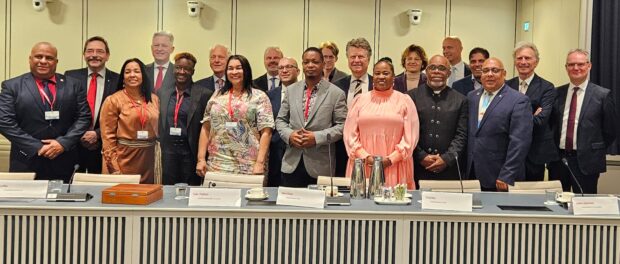BES Islands Visit to the Committee of the First Chamber

On March 25th, the delegation of Bonaire, Sint Eustatius, and Saba continued their efforts to seek dialogue and inclusion in the process of amending the WOLBES and FINBES laws.
The common delegation was welcomed by the members of the Kingdom relations committee (Korel) of the First Chamber. During the meeting, it was emphasized, as in the other meetings, that the island’s delegation was present to address concerns about the decision-making process and to advocate for open dialogue, not conflict. The islands’ delegation reiterated that they were present as a collective unit. Given the State Secretary’s stance that there will be no dialogue with the island councils, it was crucial for the delegation to engage with the committee of the First Chamber on the importance of consultation.
A common delegation member opened with a statement referencing the WOLBES law and it’s memorandum of explanation. This law affirms that an evaluation of the law should be conducted collectively and with consent of all three islands.
The constitutional advisor, who accompanied the islands, provided insight on the supranational norm of the right of self-determination, anchored in treaties and human rights charters. Reference was also made to article 132a from the Constitution of the Netherlands, in which the formal legislator created the basis for the unique structure of the islands and positive differentiation.
The Senators of the First Chamber raised questions, including inquiries about objections to the proposed changes. A delegation representative clarified that the primary concern is not the content of the amendments but the lack of an inclusive process. The agreement list, which was established in collaboration with the former state secretary, is now subject to changes by the new State Secretary without consultation with those who created it.
The delegation clarified that the WOLBES and FINBES cannot be compared to any regular law, as these laws are the constitutional DNA of the islands. It is the democratic principle upheld by the Kingdom of the Netherlands that changes to the constitution of one of its countries, be it the Netherlands, Aruba, Curacao or St. Maarten, require approval of the democratic elected bodies. The island councils therefore do not agree to the constitutional framework of the three islands being amended without including the voices of all the representatives of the people.
The delegation reaffirmed their commitment to constructive dialogue and urged decision-makers to uphold the principles of transparency and collaboration in shaping the future governance of the islands. The plea was and remains to include us, not inform us.
The meeting was conducted in a spirit of collaboration, mutual respect, and fairness. The islands’ delegation looks back on a fruitful dialogue and remains committed to continuing their efforts to have the voices of Bonaire, St. Eustatius and Saba heard.
Leave a comment
You must be logged in to post a comment.